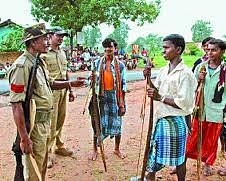
Judiciary Sees No Red
Two honorable judges of Supreme Court of India, Justices B Sudershan Reddy and S S Nijjar, in their infinite wisdom have ordered that the Chhattisgarh government disband and disarm 6,500 special police officers (SPOs) engaged in anti-Maoist operations. In their 80-page order, which often descends from a judicial perch and tends to sound like a fulminations of a far left magazine, the wise judges blamed the “neo-liberal, socio-economic policies” of the governments for the Naxal problem. May be the limelight that Justice Katju hogged, thanks to his ideology laden op-eds in a mainstream newspaper and profound courtroom pontifications he delivers on diverse subject ranging from science to history to economics to education, has blinded us from the presence of more such idealistic travelers in the judiciary.
The Supreme court decision is fraught with risk on many counts.
1. There is a fine line between judicial activism to counter governmental apathy and constitutional overstepping. Our constitution depends on maintaining a fine balance of checks and balances. Therefore it is the context that determines the treading of fine line. The Supreme court is taking decisions because the polity has failed. While that may be the case, such activism need to be tempered and restrained with the recognition governance is a monumental challenge in a complex cauldron. Of late, restraint is becoming a rarity even in the judiciary.
2. The Supreme Court’s decision is setting an important precedence. In fact, way before independence and in many instances since, the state for various reasons, chief among them the lack of policing density, has developed a citizen force to form a first line of difference. In Punjab and in J&K for example, it is the VDC and SPOs that have played a decisive role in setting up anti insurgency intelligence network and security at a local level. While there is a case for proper use, moderation and oversight, this important mechanism should not be thrown out of the calculus merely to cater to the sense and sensibilities of financially flourishing cottage industry of far left activism some of whom turn out to be aesthetic, overground face of underground macabre terror. To do so would deprive an often strapped state apparatus a vital option in the fight against insurgents.
3. The decision also indicates, at a certain level, a complete lack of understanding of the danger that these fissiparous forces pose to the Indian state and nation as well as a low appreciation of the opponent’s capabilities. There is a very serious national security threat that is being brushed aside. The Maoists are not normal people. They are in the same category of every other known terrorist outfit out to destroy the republic and in a war, one side alone cannot be adhering to all rules when the other side is ruthless in its attacks.
4. It also indicates a certain level of intellectual arrogance, to term tribals as incapable of protecting themselves or conducting themselves in a civilized manner. In fact, they have been more civilized then the usually upper caste, upper class urban educated Maoists. They have never been a greater threat to India than the Maoists and they will never be.
The Supreme Court, like any other constitutional entity, is made up of people. The Honourable Judges can be swayed by populist discourse by a propagandist media. Surely in a country with vibrant democratic discourse judges can be possibly get persuaded reading a EPW editorial or documentary made by a fellow traveller broadcast in NDTV. Concerted campaign to discredit Salwa Judum has been on for long and did reach a crescendo last year. They shouldn’t but it is not easy for the judges to be immune to it. Generally speaking and to their credit, the SC judges have not been succumbing to the shrill voice of populist discourse in the name of “secularism”.
This decision is unfortunate for this will become a precedence and robs the government legitimate and effective options now in this case and in the future. It is the Republic of India that is the loser here. It is high time the political establishment get their act together and I am sure that will lead the SC to be on the right side of the fine line between activism.
It calls for the political parties to develop a bipartisan approach to get fight the red menace. Unfortunately, the Center, while promising all help and undertaking some structural responses to boost the ability of state governments, does not seem to get rid of the bad habit of politicking in this area.
One hope that the SC judgement on this case, will make the politicians in Chattisgarh, BJP and in the Centre and Congress to react to the erosion to their space by the SC in a positive way. Bring about a bipartisan approach, deliver peace by getting rid of Maoists. Once that is done and development and governance improves, it will give less room for the SC to overs step that fine line. I am sure that SC would be glad to do that.
Until then, such judgments will happen. The fallout of this will be borne by not those sitting in Delhi or digital strategic affairs community , but by the people in the areas where these terrorists infest. It is they who will pay with their blood and property for the high sounding democratic principles and points of view by Leftist elite safely ensconced in Lutyens Delhi .